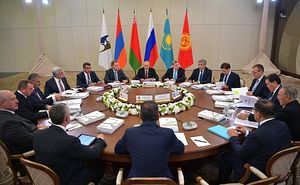In the past few weeks, there were some discussions inside Tajikistan about its potential membership in the Eurasian Economic Union (EAEU). Although for Tajikistan, joining the EAEU has been on the table for a while, there are indications that Tajikistan’s future in the organization hinges in part on Uzbekistan’s decision and timeline for EAEU membership. Uzbekistan’s course will be defining for Tajikistan. If and when Uzbekistan enters the organization, Tajikistan will have little choice but to follow.
The most recent discussions about EAEU membership were revived when Tajik Customs Service Chief Khurshed Karimzoda, speaking unofficially, on July 30 said that the EAEU will have negative consequences for the country. According to him, earnings from customs duties, a sizable portion of the country’s budget, will disappear. Karimzoda proposed instead the continuation of bilateral economic relations with the EAEU member countries.
Several days later, on August 3, Tajik Minister of Economic Development and Trade Zavqi Zavqizoda chimed in and said that Tajikistan is studying the advantages and disadvantages of other countries that have joined the EAEU and that a decision on the country’s accession to the union will be made only after a careful consideration.
Zavqizoda’s comment was similar to the statement given by Uzbek President Shavkat Mirziyoyev back in June 2019, when he, for the first time, spoke about having trouble with finding markets for Uzbekistan-made products and announced that Tashkent was considering the pros and cons of joining the EAEU.
Given Tajikistan’s dependence on Uzbekistan’s economy and territory for trade, the political and economic parallels between the two countries are not surprising. All of Tajikistan’s international rail and much of its road transport network must pass through Uzbekistan to access markets for imports and exports.
Back in 2019, a senior official from one of Tajikistan’s economic institutions spoke anonymously about the negative consequences for the country in the event of Uzbekistan’s membership in the EAEU. The first reason he listed was that Uzbekistan’s entry into the EAEU would make Tajikistan the only country without synchronized and advanced customs, sanitary, and phytosanitary norms applied to EAEU members in the region (except Turkmenistan). Furthermore, the official added that Uzbekistan would become more attractive compared to Tajikistan for investments as a result of a common EAEU market. Another concern was that large transportation corridors would circumvent Tajikistan to avoid higher customs duties and that would further isolate Tajikistan.
It appears that Dushanbe is closely watching Tashkent’s activities in terms of the EAEU and postponing a final decision on its own course. The Ministry of Economic Development of Tajikistan already completed and presented a study back in 2016 to the rest of the government on the economic consequences of Tajikistan’s possible membership in the EAEU.
Frederick Starr, chairman of the Central Asia-Caucasus Institute, at the end of 2019 suggested that Tashkent’s announcement postponing its decision regarding becoming a EAEU member was to help Dushanbe prepare for the economic consequences that would follow.
Both Uzbekistan and Tajikistan feel similar pressures from Russia to join the organization. One point of pressure are the labor migrants that both countries send to Russia. Although the total number of labor migrants from Tajikistan is not as high as migrants from Uzbekistan (in 2019, 424,727 and 890,893, respectively, according to the United Nations Population Division), in relation to its total population Tajikistan sends a larger share (5 percent and 3 percent, respectively). Therefore, the remittances these migrants send constitute a larger share of Tajikistan’s GDP compared to Uzbekistan’s.
Tajikistan, with a smaller economy than Uzbekistan and geographically dependent on Uzbekistan, is highly dependent on Tashkent’s decisions. As long as Uzbekistan remains outside the EAEU, Tajikistan’s external relations remain less dependent on Russia and the union. But Tashkent’s potential membership will exert serious pressure by default on Dushanbe, inflaming fears of isolation. If Uzbekistan enters the EAEU, Tajikistan will have little choice but to follow.

































